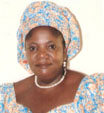 Nigerian environmentalist and lecturer Julia Finomo will give a talk titled “The Cost-Benefit Analysis of Oil Drilling in the Niger Delta: An Ethical Approach” on Thursday, Sept. 12 at 4:30 p.m. in Rehm Library, Smith Hall at the College of the Holy Cross. The lecture is free and open to the public.
Nigerian environmentalist and lecturer Julia Finomo will give a talk titled “The Cost-Benefit Analysis of Oil Drilling in the Niger Delta: An Ethical Approach” on Thursday, Sept. 12 at 4:30 p.m. in Rehm Library, Smith Hall at the College of the Holy Cross. The lecture is free and open to the public.
Since the discovery of oil in the Niger Delta in 1956, oil spills and gas flares have caused irreparable harm to the fragile ecosystems and to the livelihood of inhabitants in the Niger Delta region. Slack practices of multinational oil companies exploit the land and its people, while lenient government standards and protests by natives often result in more pollution, corruption and violence.
In her talk, Finomo will describe the degradation of the region and will advocate for an ecological solidarity among the oil companies, government officials and the people of the Niger Delta to clear a path to sustainability.
“Respect for life, and above all, for the dignity of the human person, ought to be the ultimate guiding norm for any sound economic, industrial or scientific progress,” Finomo wrote. “Nothing short of radical change of attitude, in fact, a revolution in human’s assessment of the earth and their relationship with it, is needed to pull the Niger Delta environment successfully back from the brink of a looming catastrophe.”
Julia Finomo is a lecturer at the University of Port Harcourt in Nigeria. She has written a number of articles, book chapters and academic papers on the situation in the Niger Delta.
The lecture is sponsored by the Rev. Michael C. McFarland, S.J. Center for Religion, Ethics and Culture at Holy Cross. Learn more and watch lectures online at www.holycross.edu/mcfarlandcenter.
About the Rev. Michael C. McFarland, S.J. Center for Religion, Ethics and Culture:
Established in 2001 and housed in Smith Hall, the McFarland Center for Religion, Ethics and Culture provides resources for faculty and course development, sponsors conferences and college-wide teaching events, hosts visiting fellows, and coordinates a number of campus lecture series. Rooted in the College’s commitment to invite conversation about basic human questions, the Center welcomes persons of all faiths and seeks to foster dialogue that acknowledges and respects differences, providing a forum for intellectual exchange that is interreligious, interdisciplinary, intercultural, and international in scope. The Center also brings members of the Holy Cross community into conversation with the Greater Worcester community, the academic community, and the wider world to examine the role of faith and inquiry in higher education and in the larger culture.
Holy Cross Lecture to Weigh Costs of Oil Drilling in Niger Delta
Read Time
2 Minutes